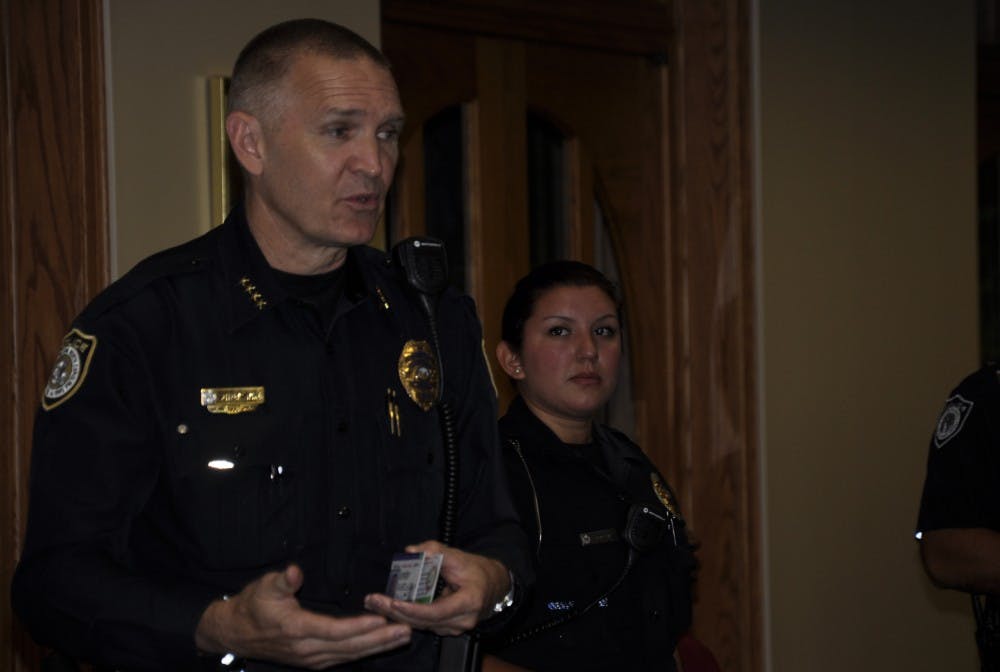Three percent of all undocumented immigrants in the United States live in North Carolina, according to the Department of Homeland Security. One of the counties with the largest immigrant population is Alamance.
Undocumented immigrants are those that entered the United States without legal permission or through the use of false papers. As a result these immigrants carry no recognized form of identification, something that Jeffrey Smythe, chief of the Burlington Police, said makes them especially vulnerable to crime as they have nothing to show law enforcement if they commit or are suspected of a crime.
To Smythe, it is important that every resident in Alamance County feels safe and protected whether or not they are citizens.
"I have an opinion as a professional police officer that those folks are safer when they feel confident enough to call the police," he said.
[youtube=https://www.youtube.com/watch?v=j5iDKi2sQmY&noredirect=1&w=560&h=315]
To build this trust, Smythe and his department have partnered with the local Blessed Sacrament Church to distribute and accept Faith Action ID cards, but a bill currently in the N. C. General Assembly could make those ID cards illegal.
The Faith Action ID program was established by Faith Action International House, a nonprofit organization in Greensboro. The program provides an alternative ID program to residents of certain communities that cannot get a government issued ID The program is new to Alamance County, as Blessed Sacrament and the Burlington Police Department partnered to implement the program locally this summer.
The Faith Action ID drive provides any resident of Alamance County with a non-government issued ID card to show proof of residency. These IDs are accepted by the Graham, Elon and Burlington police but they are not accepted by the Sheriff's department or the N.C. Highway Patrol and they are not driver's licenses or voter IDs. The IDs also do not protect residents who are suspects in a crime.
House Bill 318, short titled, Protect North Carolina Workers Act, is a bill currently being looked at in the N.C. Senate. The purpose of the bill is to make stricter rules for employers that are verifying whether or not their employees can legally work in North Carolina. The bill also includes a section that tightens rules regarding the forms of identification that government and law enforcement officers can accept.
If this part of the bill passes, it would make it illegal for local police such as the Elon, Burlington and Graham police departments to accept the Faith Action ID cards.
According to Smythe, if these IDs are taken away, residents will be less trusting of and less likely to call the police if they need help.
"Professionally, I think it's not the right choice to make, because we're changing lives with these folks," he said.
To Smythe one of the main goals of the program is establishing trust between his department and the people they serve.
"If you come from a place where you can't trust the police and you can't trust the government I'm here to tell you that's different in North Carolina and it's different in Burlington," he said, speaking to the group gathered for the ID drive.
As of 8 p.m. on Monday, Sept. 28, the bill has passed the second reading in the senate. The bill needs to pass one more reading to leave the senate floor, but because the senate added two amendments to the bill, it needs to return to the house for another vote before the bill reaches Governor Pat McCrory's desk.
Local activist group, Fairness Alamance, is responding to this bill by contacting and writing letters to the district's senators and local representatives. A representative of the group, Ben Ansbacher, said this is an issue Elon students should care about because it is so close to the nearby community.
"I think it's people's Christian responsibility to worry about their neighbors and to welcome all their neighbors," he said.
Elon Local News reached out to the four sponsors of the bill, but they have not yet responded.
Blessed Sacrament Church has another ID Drive scheduled for Oct. 31.
Elon Local News will continue to follow this story as it develops.


